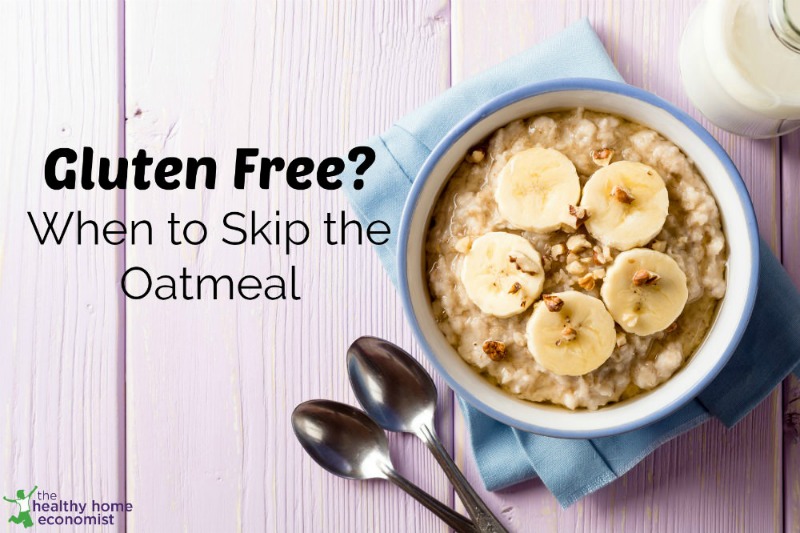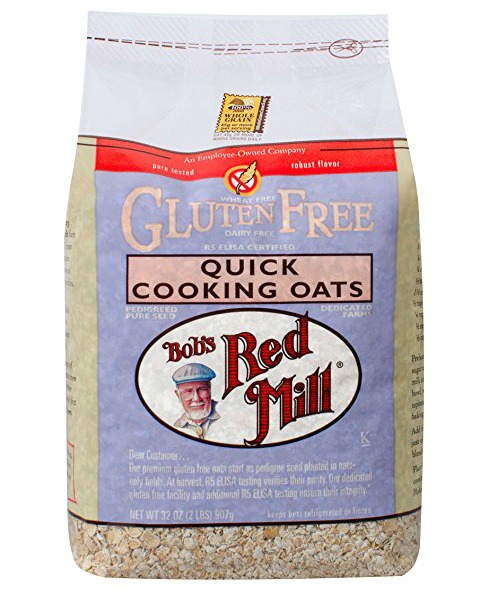The reason certified uncontaminated oats and oatmeal are never truly gluten-free and why those who are Celiac should avoid them unless they have been biopsied first.
A person who is “celiac” suffers from the serious autoimmune system disorder called Celiac (Coeliac) disease. This condition is an inherited genetic disease characterized by damage to the intestinal mucosa from exposure to gluten.
Gluten is a difficult to digest plant protein contained in some types of grains. All types of wheat contain it including einkorn, spelt, kamut, farro (emmer), durum, semolina, and bulgur.
Barley and rye also contain gluten as does the wheat/rye hybrid triticale.
Any processed food with even tiny amounts of these grains can trigger symptoms. Hence, complete avoidance of these foods is necessary for celiacs. Usually, gluten sensitive individuals must avoid these grains as well, although einkorn which contains “good gluten” is sometimes tolerated.
Not All Gluten Free Grains Safe for Celiacs
Switching to gluten free grains is the usual course of action when Celiac is the diagnosis. Examples include millet, corn, rice, and sorghum.
Pseudo cereal grains such as quinoa, aramanth, teff and buckwheat are also excellent options for those avoiding gluten.
Some diagnosed celiacs choose to go paleo or keto and avoid grains completely. As it turns out, this is a good idea for some of them given that one gluten free grain in particular is proving to be no safer than wheat, barley, and rye.
The Gluten Free Grain that Isn’t
You might have guessed that the grain I’m referring to is oats. Next to rice, oats is the most popular gluten free grain on the market.
When processed in a certified gluten free facility to prevent cross contamination, oats present an attractive alternative to those who are gluten sensitive and/or Celiac.
However, research now indicates that even uncontaminated oat groats are best avoided by these individuals.
Avenin in Oats
The trouble with even certified gluten free oats is that they contain the protein avenin.
Avenin is a gluten-like protein that triggers symptoms for approximately one in five celiacs.
Current gluten sensitivity tests only measure for gliadin in wheat, hordein in barley, and secalin in rye. Avenin requires a different test and is increasingly classified along with other gluten proteins. A good gastroenterologist will test for all 4 proteins.
Hence, a growing number of practitioners are recommending that celiac sufferers avoid all oats unless they have had a biopsy prior to and during consumption to confirm tolerance. (1)
Dr. Robert Anderson, a fellow of the Royal Australasian College of Physicians and an internationally recognized expert in celiac Disease also advocates for this approach. (2)
Are Oats Gluten Free?
The fact that 1:5 celiacs react to pure, uncontaminated oats is concerning given that many foods in North America that contain them are labeled “gluten free”. This is a hugely confusing labeling policy that causes many people to consume oats who should otherwise avoid them.
The truth is these products are not safe for a large number of celiacs and potentially gluten sensitive people as well. (3)
Beware!

Some Countries Do Not Allow Gluten Free Oats Label
Other countries require more strict labeling of oats than the United States, Canada, and the UK.
For example, the Australia New Zealand Food Standards Code prohibits foods that contain oats to be advertised or labeled gluten free.
This only adds to consumer confusion as the same exact same brand can be labeled gluten free in one country and not in another.
No wonder so many people are confused about whether oats are truly gluten free and their safety for celiacs and the gluten sensitive!
Eat Oats or Not?
If you are celiac, it is best to avoid oats no matter what the label says. This includes sprouted and overnight soaked oats too. Gluten sensitive individuals would be wise to tread carefully with this gluten free grain as well.
While oats technically are gluten free, the protein avenin triggers a gluten-like reaction in approximately 20% of celiacs. At the present time, it is unknown how many gluten sensitive, nonceliac people react to oats.
If you are celiac and want to eat them anyway, be sure to get a biopsy test before and after eating uncontaminated oats. This precaution will ensure that you have a tolerance for avenin. Otherwise, you risk relapse or preclude the chance for remission from your celiac symptoms.








I praise and thank God Most High. I had soaked a large bowl of so called gluten free oats and consequently consumed a large amount the following day. My diet is under strict control, yet just a few days I have been itching as I have not done for a long period.
Thank God I’ve come across this article unexpectedly and thanks Sarah for your hardwork, time and thorough research.
It’s so essential to know ourselves and what we are nourished with. Definitely no more oats due to this confirmation that I suspected before was a cause of my skin to react to.
So, you’re saying the oats are gluten free, and the title is worse than clickbait because it’s outright lying? The article has useful information, but your title has turned me off to any more of your aticles and this site, as a whole.
I can see why you might think that … did you read the article to the end? Consider that other countries don’t allow even uncontaminated oats to be labeled or advertised gluten free. That’s the piece of info that got me started researching this to begin with and that is what the title is referring to. Oats are not ever considered to be gluten free in some countries because they trigger symptoms in such a large number of people. Hope that makes sense.
Oats in anything bloat me up horribly! Definetly not Gluren free!
What you are saying is what I’ve long suspected…yet another previously enjoyed food which is now off limits…thank you for the confirmation
I am celiac and cannot tolerate oats. Thank you for your info. We must share as much as possible as unless you learn to take care of yourself you can end up worse with drs. Advice. Many are just not celiac literate. Watch your prescription drugs for contaminates as well. Too often I have heard from a Dr or pharmacist a little won’t hurt you!
Thank you so much for this info. I have had to cut gluten AND dairy out of my diet, but stay sick much of the time. Will definitely avoid oats now, too. Thank you for more information. There are still other items making me ill, just unsure what they are. Thank you very much!
My wife and I are celiacs as are three of our five children. Only one of them can eat oats. The oldest can tolerate an expensive oats.The rest of us have tried almost all kinds of oats and end up with intestinal discomfort and abdominal pain that lasts for days. So oats are definitely not on the menu. We have also noticed one of our grandsons seams to be starting to react to gluten, he’s five years old, about the same age his father was when his mother figured out he has celiac. That was over twenty five years go. Back then, there was almost nothing out there for celiacs. It was very difficult feed him, as my wife says, had to go back to the basics, no premade or fast foods.
Sarah, your article on Oats is wonderful. I am celiac; must be extremely careful. I’ve met a wonderful Dr. in FL who is practicing preventive healing; She has removed ALL grain from my diet and what a difference. I do not like
eating out as restaurant food is so adulterated: not “clean”, not gluten free. GF is very misunderstood, and I can tell within a hour if I’ve accidentally eaten some. It takes weeks to cleanse my body. Every little bit of information is helpful.. Thank you !
THANK YOU!! I was diagnosed in October 2017, nearly a year ago and I’m still not well.
For me “not well” has nothing to do with an upset stomach, it means frequent iron infusions & chronic vitamin deficiencies that leave me feeling terrible most of the time.
I suspected oats may be a problem so now I only eat Certified Gluten Free oatmeal but I still feel like crap so I’m taking your advice and staying away from oats all together.
Now if only I could figure out everything else like what spices are safe for example. Sighhhh seems so simple but it’s extremely overwhelming to live like this.
Thanks so much for the much needed info on oats!
Stella
I am celiac and oats make me very sick. Even rice and rice flours upset my stomach. I don’t think there was enough research done, if any, on oats in the celiac diet.